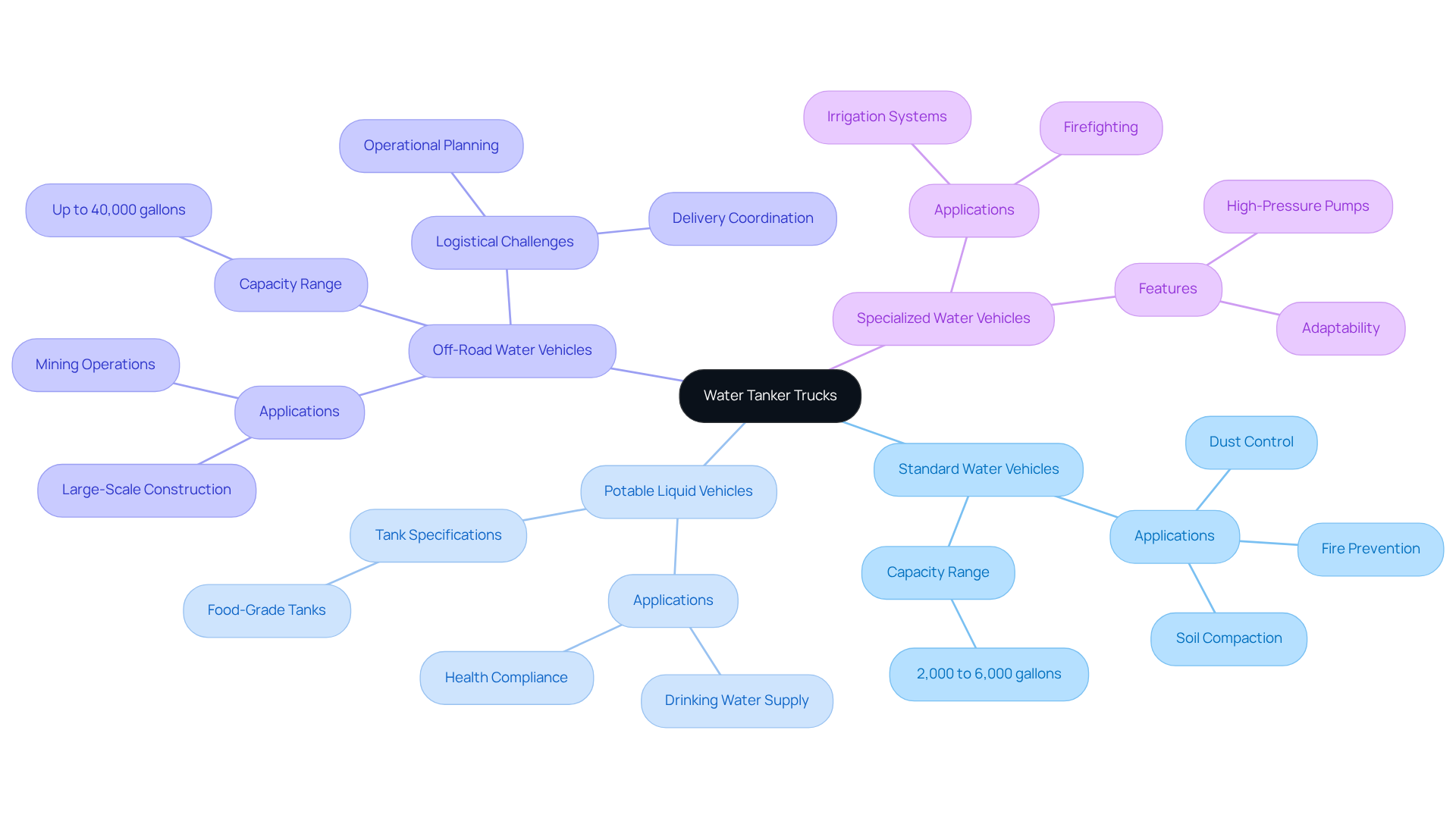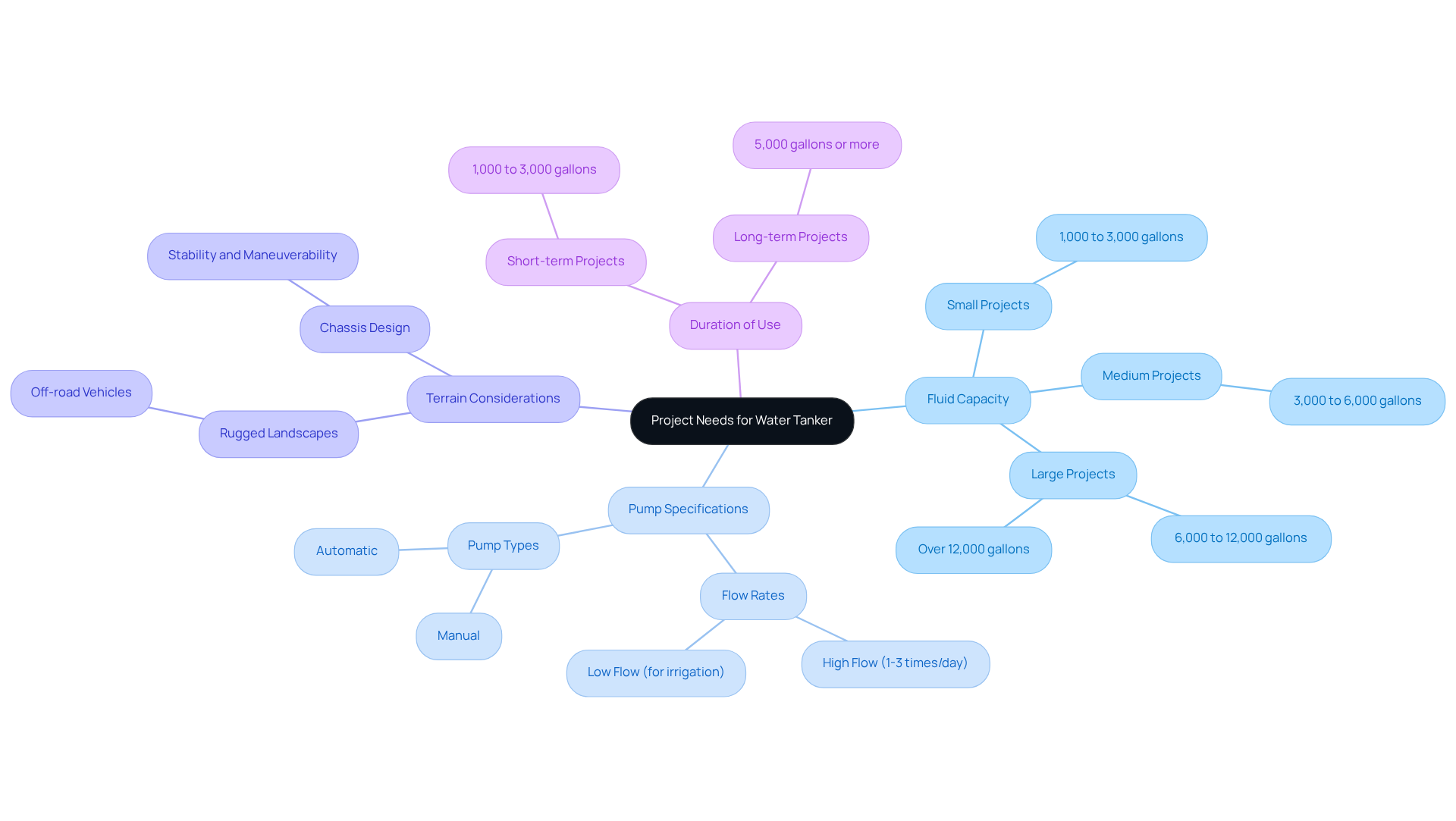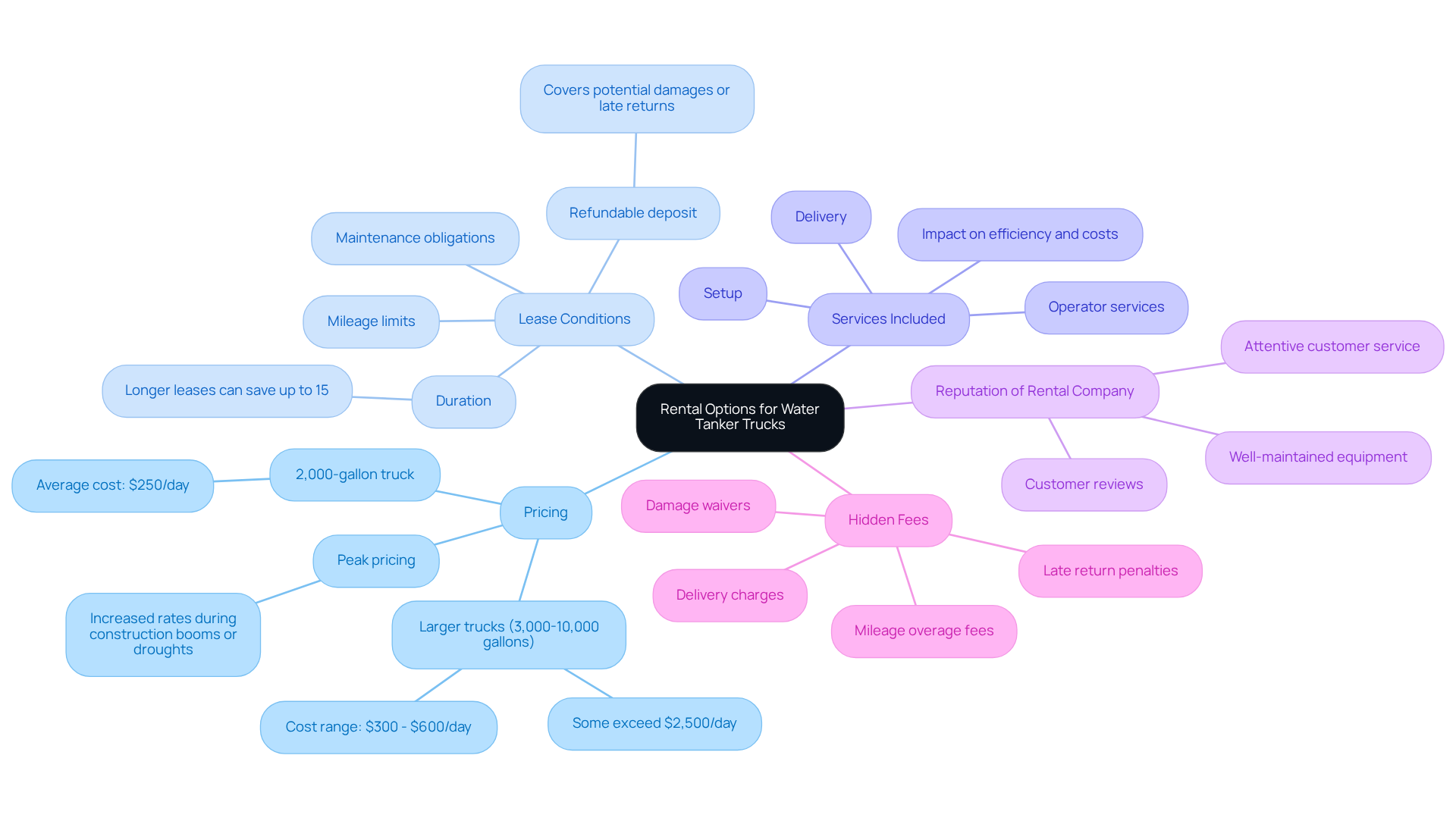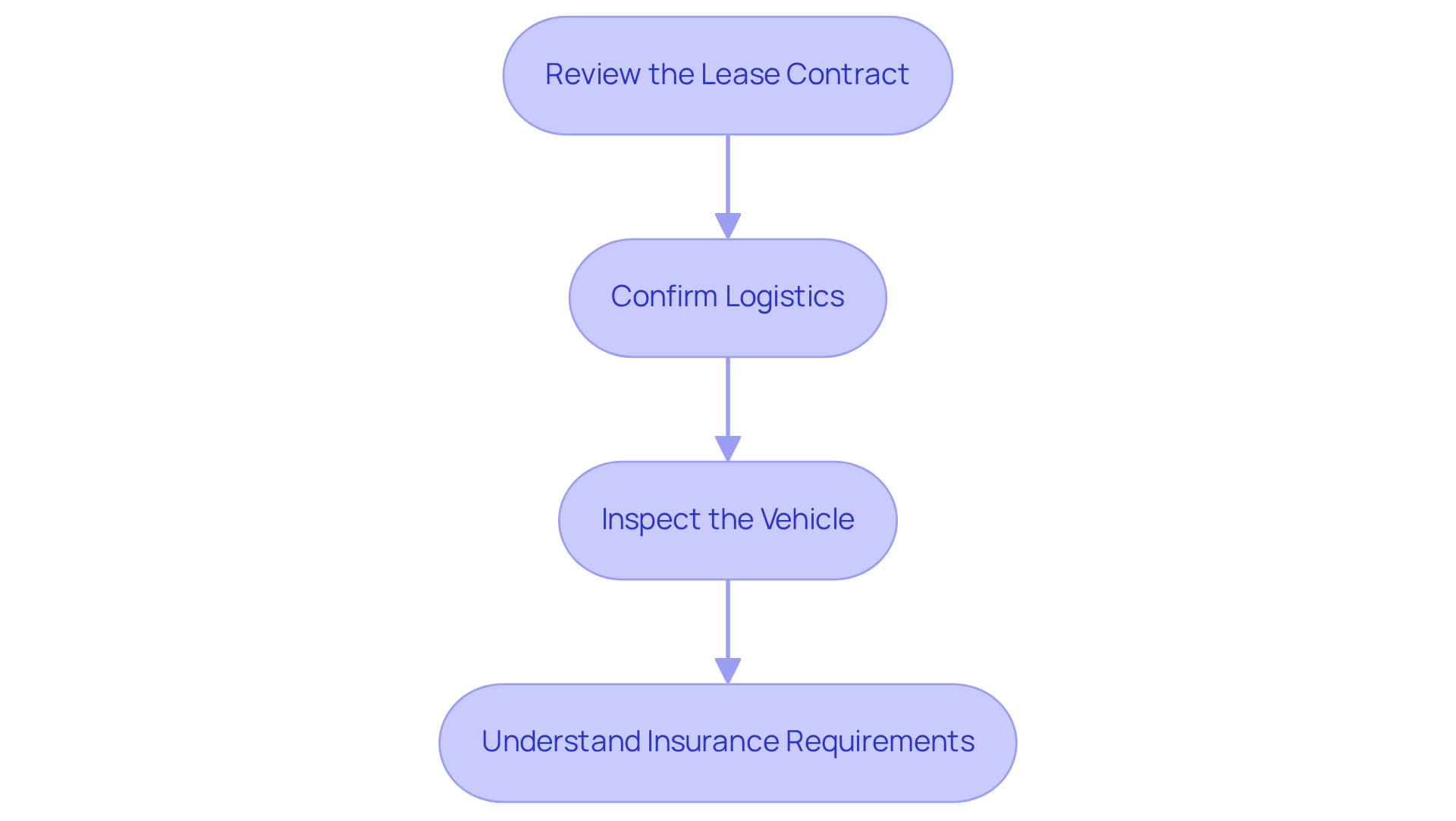Overview
This article effectively addresses the mastery of renting water tanker trucks for construction needs. It outlines the various types of vehicles available, their specific uses, and the key considerations for rental. Understanding project requirements—such as fluid capacity, terrain, and rental terms—is crucial. Furthermore, the article provides detailed insights on pricing and logistical steps to finalize a rental agreement, ensuring both efficiency and compliance on construction sites.
Key Highlights:
- Water tanker trucks are essential in construction, with various types tailored for specific tasks.
- Standard Water Vehicles are used for dust control, soil compaction, and fire prevention, with capacities from 2,000 to 6,000 gallons.
- Potable Liquid Vehicles carry drinking water, ensuring compliance with health standards.
- Off-Road Water Vehicles, with capacities up to 40,000 gallons, are designed for rugged terrains in mining and large-scale projects.
- Specialised Water Vehicles may include high-pressure pumps for firefighting or irrigation, enhancing their versatility.
- Choosing the right tanker requires assessing fluid capacity, pump specifications, terrain, and project duration.
- Rental pricing varies by vehicle size and lease duration, with larger trucks costing more, especially during peak demand.
- Lease conditions, included services, and the rental company's reputation are critical factors in making an informed rental decision.
- Finalising a rental involves reviewing contracts, confirming logistics, inspecting the vehicle, and understanding insurance requirements.
Introduction
Understanding the intricacies of water tanker truck rentals is crucial for enhancing the efficiency of construction projects. These vehicles are not merely essential for transporting water; they are available in various types tailored for specific applications, ranging from dust control to irrigation.
However, navigating the rental landscape can be daunting. Factors such as pricing, specifications, and logistics play critical roles in the decision-making process.
How can construction managers ensure they select the right tanker truck to meet their project needs while staying within budget?
Understand Water Tanker Trucks: Types and Uses
Water tanker vehicles are essential for various applications in construction, with each type tailored to meet specific needs. Understanding these categories is crucial for optimizing job site efficiency.
Standard Water Vehicles are frequently employed for dust control, soil compaction, and fire prevention. With capacities ranging from 2,000 to 6,000 gallons, they are suitable for a variety of construction tasks. Grasping the capacity of these vehicles is vital, as a tank that is too small can lead to additional trips, wasting both time and fuel.
Potable Liquid Vehicles are fitted with food-grade tanks, designed to carry drinking fluid and guarantee a safe supply for endeavors that require it. This ensures compliance with health standards and enhances project reliability.
Off-Road Water Vehicles are engineered for tough landscapes, accommodating capacities of up to 40,000 gallons. They are indispensable in mining and large-scale construction projects, where durability and high capacity are crucial. However, coordinating the delivery and operation of these vehicles can present logistical challenges that necessitate careful planning.
Specialized Water Vehicles may include high-pressure pumps for firefighting or irrigation systems for agricultural uses, increasing their adaptability in diverse operational environments. This versatility ensures that projects can be executed efficiently under varying conditions.
Integrating insights from industry leaders can further guide best practices in choosing and utilizing tanker vehicles. Moreover, employing a water tanker truck rental for liquids can often be more cost-effective than establishing a permanent irrigation system, especially for short-term initiatives. It is also essential to consider environmental regulations regarding resource usage to ensure responsible operations.
Comprehending the various types of tanker vehicles, especially those available for water tanker truck rental, and their specific applications is crucial for selecting the appropriate equipment for your construction endeavors. This knowledge not only ensures efficiency but also aids in managing costs effectively. Engage with us today to explore the best options for your project.

Identify Your Project Needs: Specifications and Capacity
Selecting the ideal water tanker truck for your construction project requires careful consideration of specific specifications and capacity needs.
Fluid Capacity: Assess your liquid requirements based on the size of your project. For instance, a minor landscaping project may necessitate a vehicle with a capacity of around 2,000 gallons, whereas larger construction sites often demand vehicles that can accommodate 5,000 gallons or more. Generally, large liquid tank vehicles hold between 6,000 to 12,000 gallons, making them suitable for high-demand settings.
Pump Specifications: Evaluate the pump's flow rate and pressure. Higher flow rates are crucial for tasks such as dust suppression, which may require water application between 1-3 times a day, while lower rates may suffice for irrigation purposes. The pump system, powered by the vehicle's engine, can be either manual or automatic, tailored to specific operational requirements.
Terrain Considerations: If your undertaking involves rugged landscapes, opt for off-road vehicles designed to navigate challenging conditions. The chassis design and suspension system are vital for stability and maneuverability, particularly when transporting heavy loads over uneven surfaces.
Duration of Use: Consider the length of time you will need the vehicle. Short-term projects may benefit from smaller vehicles with capacities ranging from 1,000 to 3,000 gallons, while long-term initiatives might require larger capacities to ensure a consistent supply.
By clearly identifying these needs, you can effectively select a tanker vehicle that aligns with your project requirements, ensuring operational efficiency and safety on site.

Compare Rental Options: Pricing, Terms, and Services
When evaluating rental options for water tanker trucks, several critical factors demand your attention:
-
Pricing: Rental fees fluctuate based on vehicle size, capacity, and lease duration. For instance, a 2,000-gallon truck typically costs around $250 per day, whereas larger trucks range from $300 to $600 daily, with some exceeding $2,500 depending on the leasing firm and market conditions. Be mindful that leasing rates often escalate during peak times, such as construction booms or droughts, significantly impacting your budget.
-
Lease Conditions: Scrutinize the agreement's conditions, including duration, mileage limits, and maintenance obligations. Grasping these elements is essential, as longer leases can yield savings of up to 15% on total expenses. Moreover, a refundable deposit is generally required to cover potential damages or late returns, which should be factored into your upfront costs.
-
Services Included: Assess whether the leasing company provides additional services such as delivery, setup, and operator services. These offerings can greatly influence efficiency and overall expenses, particularly during peak construction seasons when demand is heightened.
-
Reputation of Rental Company: Research the rental company’s reputation through reviews and testimonials. A reliable supplier will deliver well-maintained equipment and attentive customer service, crucial for minimizing downtime and ensuring project success.
-
Hidden Fees: Stay vigilant regarding common hidden charges that may arise, such as mileage overage fees and late return penalties. Understanding these potential additional costs will empower you to manage your budget more effectively.
By meticulously comparing these factors, you can make an informed decision about water tanker truck rental that aligns with your budget and project requirements, ultimately enhancing the efficiency and effectiveness of your construction operations.

Finalize Your Rental: Contracts and Logistics
To successfully finalize your water tanker truck rental, follow these essential steps:
- Review the Lease Contract: Begin by thoroughly examining the agreement. Pay close attention to the terms regarding duration, payment schedules, and your responsibilities concerning maintenance and damages.
- Confirm Logistics: Organize the delivery and collection of the vehicle by providing the leasing company with detailed job site information. Make sure they are aware of any access challenges that could impact delivery.
- Inspect the Vehicle: Conduct a comprehensive inspection before accepting the vehicle. Verify that it meets your specifications and is in optimal working condition. Document any pre-existing damages to avoid disputes later.
- Understand Insurance Requirements: Inquire whether the leasing company mandates insurance coverage for the truck during the hire period. If insurance is required, ensure that you have the necessary documentation prepared.
By diligently following these steps, you can confidently finalize your water tanker truck rental, ensuring you have the right equipment to meet your construction needs.

Conclusion
Understanding the intricacies of water tanker truck rentals is paramount for optimizing construction projects. By recognizing the various types of water tanker trucks and their specific applications, construction managers can make informed decisions that enhance operational efficiency and project reliability. Selecting the right vehicle streamlines workflows and ensures compliance with safety and environmental regulations.
Key considerations include:
- Assessing project needs, such as fluid capacity and terrain
- Comparing rental options based on pricing, lease terms, and included services
Each factor plays a pivotal role in determining the most suitable water tanker truck for any task. Additionally, finalizing the rental process with careful attention to contracts and logistics can prevent potential issues and ensure that the equipment is ready for immediate use.
Ultimately, leveraging the insights provided in this guide can lead to significant cost savings and improved project outcomes. Engaging with reputable rental services and understanding the specifics of water tanker trucks empowers construction professionals to execute their projects more effectively. Taking the time to evaluate these elements not only enhances operational efficiency but also contributes to the overall success of construction initiatives.
Frequently Asked Questions
What are the main types of water tanker trucks?
The main types of water tanker trucks include Standard Water Vehicles, Potable Liquid Vehicles, Off-Road Water Vehicles, and Specialized Water Vehicles.
What is the purpose of Standard Water Vehicles?
Standard Water Vehicles are commonly used for dust control, soil compaction, and fire prevention, with capacities ranging from 2,000 to 6,000 gallons.
What distinguishes Potable Liquid Vehicles from other types?
Potable Liquid Vehicles are equipped with food-grade tanks designed to carry drinking water, ensuring compliance with health standards for projects that require a safe water supply.
In what scenarios are Off-Road Water Vehicles utilized?
Off-Road Water Vehicles are designed for challenging terrains and can hold up to 40,000 gallons, making them essential for mining and large-scale construction projects.
What are the benefits of Specialized Water Vehicles?
Specialized Water Vehicles may include high-pressure pumps for firefighting or irrigation systems for agricultural purposes, allowing for increased adaptability in various operational environments.
How can renting a water tanker truck be advantageous?
Renting a water tanker truck for liquids can be more cost-effective than establishing a permanent irrigation system, especially for short-term projects.
Why is it important to understand the capacities of water tanker trucks?
Understanding the capacities of water tanker trucks is essential to avoid additional trips that waste time and fuel, ensuring job site efficiency.
What should be considered regarding environmental regulations when using water tanker trucks?
It is important to consider environmental regulations regarding resource usage to ensure responsible operations during water transportation and application.




